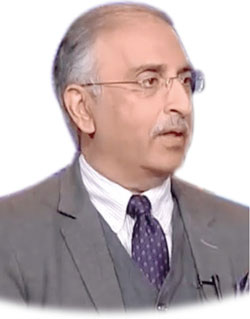Problem-solution
Problem: According to All Pakistan Textile Mills Association (APTMA), “$250 million of textiles exports were lost last month after mills in Punjab were forced to shut for 15 days.” Shahid Sattar, executive director APTMA, said, “The supply shortfall is due to the energy ministry’s inability to arrange supply, and is hurting the very future of Pakistan’s exports and economy.”
Solution: Our Minister of Energy challenged anyone and everyone to debate the country’s gas issues on television. I am convinced that the Minister of Energy can beat anyone and everyone in a debate but the debate will neither solve the issue of gas shortage nor would the debate bring back the lost $250 million.
Problem: According to the Pakistan Bureau of Statistics (PBS), Monthly Review on Price Indices of December 2021, the year-on-year Wholesale Price Index (WPI) jumped by a whopping 26 percent; Sensitive Price Index (SPI) by 21 percent and Consumer Price Index (CPI) by 12.3 percent. If wholesale prices have gone up a hefty 26 percent then consumer prices are not about to retreat either.
Solution: The federal government “has decided in principle to change the formula for determining the rate of inflation in the country and in this, the PBS has started the preliminary work.”
According to sources, the “authorities would alter the ratio and weightage of the items included in the basket for determining the Consumer Price Indie (CPI) and Sensitive Price Index (SPI) to calculate the rate of inflation and price hike.”
Problem: According to the Pakistan Bureau of Statistics, Monthly Review on Price Indices of December 2021, the year-on-year price of petrol has gone up by 72 percent.
Solution: PM Imran Khan, addressing a gathering in Attock, “defended his decision to increase petroleum prices in the country, saying the rates in his country were still the lowest among the oil importing world.”
Problem: According to the Pakistan Bureau of Statistics, Monthly Review on Price Indices of December 2021, the year-on-year price of cooking oil is up 59 percent, pulse masoor up 34 percent, fruits up 30 percent, meat up 20 percent and wheat flour up 19 percent.
Solution: According to PM Imran Khan, “Pakistan is the cheapest country in the world.” On January 3, PM Imran Khan asked the PTI spokespersons to “inform the masses that there is no inflation in the country.”
Problem: According to IPSOS, the Paris-based market research company, “70 percent of Pakistanis see unemployment as the biggest issue of the country.”
Solution: Ehsaas Cards, Sehat Insaf Cards, Kissan Cards, Ration Cards, Panah Gahs and Ehsaas Langar-Khanas.
Problem: An average Pakistani consumes 25 kilograms of sugar a year and the price of sugar has gone up from Rs55 per kg to Rs120 per kg over the past three years.
Solution: The federal minister for Kashmir Affairs says, “Today we say that sugar has become expensive. Can’t we sacrifice a little and reduce the quantity of sugar in our tea and eat less bread?”
According to the Pakistan Bureau of Statistics, Monthly Review on Price Indices of December 2021, the year-on-year price of electricity has gone up by 59 percent. The government tells us it is all because of the previous government.
According to IPSOS, “as many as 87 percent of Pakistanis believe the country is headed in the wrong direction.” On November 9, The Guardian, the British daily newspaper, wrote: “On Friday night, 27-year-ol
Asadullah, who sold old shoes on a cart, set himself on fire in the Pakistani city of Karachi.” Fahim Mughal, a jobless media worker, also committed suicide. Our government tells us that the suicide rate in Japan is higher.
Incomes are dropping and prices are going through the roof. Pakistanis are in severe pain. All that the government has is three artifacts: justifications, blame games and propaganda. Governments are elected to come up with solutions to people’s problems-not provide justifications or play blame games.










